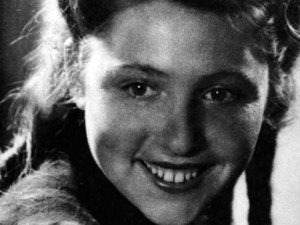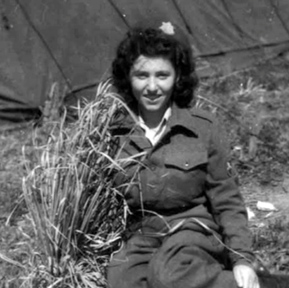I am fortunate to work closely with Ora. Though she is one of the busiest people I have ever known, we do find time to sit down and connect on the various projects going on at any given moment. On many of these occasions, Ora shares stories of her life, her family and her experiences – everything is always connected!
In a recent conversation about people who have influenced our lives, we began talking about Ora’s mother, Bella Hirsch, and the specific role she played in Ora becoming a doctor. Bella was a nurse who spent most of her career caring for soldiers and those impacted by the devastating realities of war.
So, when Ora and I were talking about her May newsletter to faculty and staff, it seemed quite fitting to share Bella’s story as a tribute to nurses, who were celebrated this month during National Nurses Week May 6-12, and in honor of Mother’s Day on May 13. With Ora’s blessing, I contacted Bella to find out more about her story. Below is what I learned about this amazing nurse, mother and woman, as well as a note from Ora. I hope you enjoy the exchange as much as I did.
~Allison Krieger, EVPMA Communications
TELL ME ABOUT YOUR EARLY YEARS.
 BH: I was born Bella Rozencweig in 1929 in Zlataust, Russia, an ancient city in the Ural Mountains on the border of Siberia. In the Czarist years, the city was renowned for its production of very splendid special swords. After the revolution, the city continued to be engaged in light industry. We never moved from Zlataust. My family lived in a fertile valley surrounded by magnificent wooded mountains. Though the winters were cold and harsh, the summers were glorious. It was wonderful to grow up in an environment surrounded by luscious nature. On the way home from school, we children would pick the wild flowers and bring home mixed bouquets. Even today I consider myself fortunate to have been one with nature.
BH: I was born Bella Rozencweig in 1929 in Zlataust, Russia, an ancient city in the Ural Mountains on the border of Siberia. In the Czarist years, the city was renowned for its production of very splendid special swords. After the revolution, the city continued to be engaged in light industry. We never moved from Zlataust. My family lived in a fertile valley surrounded by magnificent wooded mountains. Though the winters were cold and harsh, the summers were glorious. It was wonderful to grow up in an environment surrounded by luscious nature. On the way home from school, we children would pick the wild flowers and bring home mixed bouquets. Even today I consider myself fortunate to have been one with nature.
In 1941 Russia was invaded by Nazi Germany, marking the beginning of World War II for Russia. Our city was converted from production of light industry to heavy industry, manufacturing tanks and artillery equipment, which were shipped directly to the front. The trains which carried the equipment returned with wounded soldiers who were housed in public institutions converted into hospitals. Though many schools were transformed into hospitals, the school I attended functioned normally. Since most of the men were mobilized, the city, its institutions and industry were run by women. For example, my mother worked in a steel mill. Conditions of life were very difficult. Even though the fighting never reached the Ural Mountains, we lived on a war footing. We had terrible food shortages. Starvation in our city was second only to Leningrad.
WHY DID YOU BECOME A NURSE?
BH: I became a nurse for a simple reason. Before the war, Zlataust was a comparatively small mountain city. There were only two institutions of higher learning—programs for nursing and for education. Those who wanted a different course of study had to apply to universities outside the city. During the war, no one was permitted to leave the city, even to further educational objectives. Because even as a child I loved science, for me the profession of nursing was a logical choice. Also, during the war government policy encouraged youth to enter the health professions because there was a desperate shortage of nurses. The government ordered the acceleration of training programs, so that nurses could be graduated and encouraged to enlist at a very early age.
WHAT TYPE OF TRAINING DID YOU HAVE?
BH: Considering the war conditions, we received excellent training in every medical subject. We even had to study Latin, in order to understand the etymology of diseases and medications. The study was intensive, involving long hours of lectures, lab work, pathology and practical work with patients. We learned to diagnose diseases and to recommend medications and treatments for curing them.
AT WHAT AGE DID YOU FIRST CARE FOR A PATIENT?
BH: I was 17 years old when I began to work full time as a nurse.
During our studies in school, we were expected to care for patients. My first patient was a man suffering from syphilis. Even though I desperately wanted to be helpful, I remember that I felt threatened by the contagious nature of the disease. In those days, treatment of venereal disease was primitive. Nurses worked without gloves. Only doctors were given gloves and even then only when performing operations.
Another patient of mine was a woman with a stomach ulcer. For treatment, she received warm paraffin placed where the ulcer was supposedly located. Unfortunately, treatments were limited by lack of medications. Don’t forget — it was before the age of penicillin. And materials were in short supply. For example, used bandages were washed, dried, rolled and then put into an autoclave for sterilization. Similarly, syringes and needles were used over and over again after being sterilized in an autoclave.
ORA MENTIONED THAT YOU WORKED IN A DISPLACED PERSONS CAMP IN GERMANY. WHAT WAS THAT LIKE? DID YOU WORK IN OTHER SETTINGS/COUNTRIES?
BH: After we left Russia in 1946, we first moved to Poland. There, I worked with an obstetrician delivering babies in a hospital. Our degree in nursing included a degree in midwifery. We then moved to Germany to Bergen Belsen, which during the war had been a concentration camp, but, at that time, was converted into a camp for Displaced Persons. There I worked in a small hospital administered by German doctors and nurses. In addition to my regular nursing duties, I worked with toddlers of mothers who, because of their concentration camp experiences, were unable to handle their own children.

Bella in her army uniform
In 1948, I left for Israel. I joined the Israeli army. In Israel, as in Russia, there was a terrible shortage of nurses. For a short period I was sent to the front lines, and then was transferred to a field hospital. When the field hospital was eliminated during the armistice period, I was transferred to a military hospital where I worked with wounded soldiers discharged from the army.
WHAT WAS THE MOST DIFFICULT PART OF YOUR JOB? WHAT WAS THE MOST REWARDING?
BH: My most difficult task was working with severely wounded soldiers. The soldiers with whom I worked expressed profound gratitude, respect and love for their nursing care. For me, especially, there was no greater reward than seeing a soldier who had been severely wounded leave the hospital and resume civilian life again.
DO YOU THINK THAT YOU PLAYED AN INFLUENTIAL ROLE IN THREE OF YOUR FOUR CHILDREN CHOOSING CAREERS IN HEALTH CARE?
BH: I do hope that I had some influence over our children, three of whom are professors of medicine in positions of major responsibility and one who is a Rabbi in New York. It is gratifying to see that our children all selected caring professions. My husband and I made a special effort to inculcate in them a love of learning and a passion to be of service to other human beings.
WOULD 17 YEAR-OLD YOU CHOOSE A HEALTH PROFESSION TODAY?
BH: YES! YES! I would do it all over again, especially today. Because now I know why. Then, I just thought it would interest me. I know today that upon graduation one’s education only begins. To me, medical work is never routine. Every day is new, new discoveries, new methods of treatment, new medications, new instruments. So, one never stops learning. With more work comes more knowledge, and with more knowledge comes more gratification.
* * *
I want to thank my mother for sharing herself and her story, and Allison for helping me learn things about my mother that I didn’t know.
Nurses are the face of our institution and the heart of the patient care experience. We wouldn’t be a premier health system without their skills, dedication and passion for helping others. Across our vast Health System, nurses are making a difference every single day.
Thank you to the mothers, nurses, healers and caregivers who spend each day putting other people’s needs far above their own.
Ora
